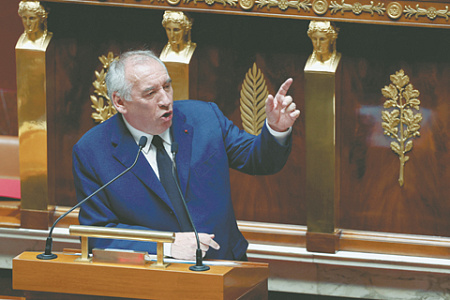
The French government, led by Prime Minister François Bayrou, is on the verge of collapse, facing an imminent no-confidence vote it is widely expected to lose. The political crisis stems from the government’s failure to secure parliamentary support for a highly contentious new budget, which includes a staggering €44 billion in state spending cuts. With most opposition factions already pledging to vote against the Prime Minister, the fall of the cabinet appears to be merely a matter of time.
This impending failure highlights the deep political paralysis gripping France. President Emmanuel Macron’s centrist coalition lacks an absolute majority in parliament, rendering it powerless without opposition support. However, the opposition itself is a fractured mix of a left-wing alliance and a resurgent far-right, both of which are staunchly against the government’s agenda. The left decries cuts to social programs and a deeply unpopular pension reform that raises the retirement age, while the far-right, led by Marine Le Pen, criticizes what it views as soft immigration policies and high fuel prices.
For Macron, this is a troubling case of déjà vu. Bayrou’s predecessor, Michel Barnier, lasted a mere 90 days in office before being ousted by a no-confidence vote following snap elections that saw the ruling coalition lose significant ground. Bayrou’s likely downfall after just eight months further underscores the fragility of Macron’s presidency and exposes critical flaws in his political strategy. While the president himself is not under direct threat of impeachment, the chronic instability of his governments severely weakens his authority and stalls his policy agenda.
The budget crisis is a direct result of conflicting demands. According to Evgenia Obichkina, a professor of international relations at MGIMO University, Macron is caught in a difficult bind. “The president absolutely must save around 40 billion euros to meet the European Union’s requirement that the state budget deficit not exceed 3.5% of GDP,” she noted, with France’s current deficit being nearly double that. Simultaneously, Macron has promised to double the defense budget, a move driven by NATO requirements and his own ambitions to position France as Europe’s political leader, creating a fundamental contradiction for any government.
The government’s attempts to justify austerity by citing a threat from Russia have failed to resonate with the French public. “Most French people consider Islamic radicals, not Russia, to be the main threat,” explains Obichkina, pointing out that religious extremism is a domestic reality for many citizens. This disconnect has fueled widespread discontent and a surge in support for the far-right National Rally. While Marine Le Pen is legally barred from holding office, party president Jordan Bardella is emerging as a formidable contender for the 2027 presidential election.
Macron’s options are limited and unappealing. Appointing another prime minister will not solve the parliamentary impasse. Calling for new legislative elections—a possibility he has so far rejected—is a high-stakes gamble that could further weaken his party’s position. While the domestic political scene is set for continued turmoil, a major shift in France’s foreign policy is unlikely. As Obichkina concludes, “Foreign policy is determined by the president, not the prime minister.” Any changes on the international stage will be a reaction to global events, not the result of another government collapse in Paris.
